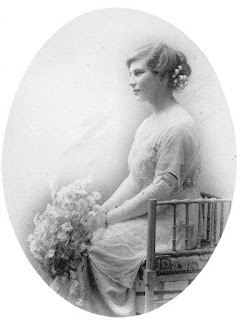 |
| Phyllis dressed for her coming out ball in Adelaide |
Little would this young doctor dream that she would become an obstetrician, paediatrician, author, journalist, columnist, ABC broadcaster and women's activist. Her early work helped save countless women and children’s lives in the Tropics, including Malaysia and New Guinea by bringing modern medicine to local communities. Later, her pioneering work and advocacy of good nutrition, family planning and child care improved Queenslanders’ lives immeasurably.
She went on to do postgraduate work at hospitals in London, Paris and New York and became a prominent member of the Queensland women's movement and highly influential in children's public health. She was ahead of her time in advocating natural childbirth, contraception, the legalisation of abortion and that fathers be present at the birth of their children. She founded the Queensland Mothercraft Association, the Queensland branch of the Business and Professional Women's Club and was President of the Queensland Medical Women's Association and her work was honoured many awards including Queenslander of the Year and Life Membership of the Australian Medical Association.
It was 65-year-long career that spanned a tumultuous 20th century that saw her embrace not only new medical breakthroughs but changing social mores. She loved and supported all of her six children too including her gay child, also a doctor, and her Aboriginal grandchild and his mother who lived amid her large extended family full of friends and patients in a rambling Edwardian house.
When the Queensland Government decided to honour Lady Cilento by naming the new children's hospital after her in 2013, it was a fitting tribute to a woman who contributed so much to public life. It was also one of only three per cent of public buildings in Australia named after women.
Lady Cilento had broken through every glass ceiling in the medical world and overcame all the sexism and misogyny she faced as a woman doctor ahead of her time. But today, her name is now to be physically torn down from the hospital by a small group of male doctors for their own vested interests - against the wishes of 82% of Queenslanders' who had voted in The Courier Mail along with 85% of nurses polled by the Nurses' Professional Association of Queensland.
These faceless doctors created unsubstantiated surveys of hospital staff to gain the government's approval and Queensland health set up a flawed poll that has been independently investigated showing the results are unrepresentative and invalid. Even though the Queensland Government say the change of name will cost $500,000 they have admitted they have done no research or formal costing. It could run into the millions of dollars of taxpayers money.
This cowardly cabal of male doctors decided it was not enough to take her name off the hospital but to try to destroy her legacy as well. Health Minister Steven Miles said at a meeting with our family that the doctors were behind a smear campaign. Miles said it was "most unfortunate" but he was not prepared to do anything about it.
These doctors have tried to manipulate the media with the sole aim to delegitimize and undermine Lady Cilento's honor in order to change the debate around the name hospital change - another example of the collusion of powerful men to negate and annihilate a woman from professional public life and history.
Removing Lady Cilento's name from the hospital will prove that Queensland - and the Labor Party - is a provincial, insular, conservative, short-sighted, petty and intolerant place that does not welcome or recognise women of talent and achievement. The Government should reverse the decison - put "public" in the name if necessary as this was the reason give for the name change - and show that it is not completely disconnected from the current worldwide movement in support of women being treated with respect professionally and their work properly recognised.

